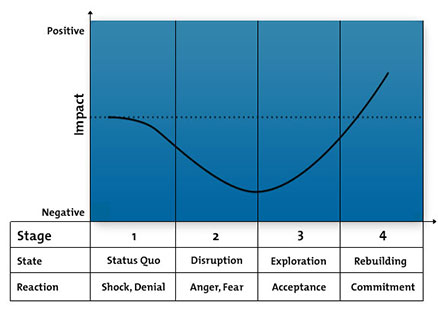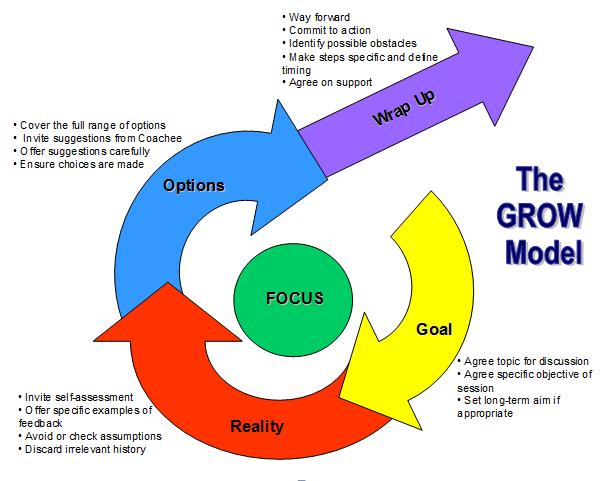Most people know that the SEO industry has changed dramatically in the last couple of years and there is an endless amount of content outlining these changes and what is expected of good SEO. But what about the managerial challenges of this ever-changing search marketing industry? We all know that change is both positive and necessary, so how can we ensure its processed and implemented effectively?
Change Management
One of the biggest challenges we face as managers is to make sure our teams can keep up with change, as people react differently to new tasks, processes, and responsibilities. Change management is a challenge in itself and requires team leaders to identify where people are in the change process and what they need to do in order to progress.
Examples of how people react to change:

Find illustration and more background here.
Considering the speed at which the industry is evolving, you can expect a lot of disruption and exploration. Processes are altering and your team will need reviews, training and supporting until they feel comfortable with any new elements of their role. One example of this is the rapid shift towards PR and journalism-based search marketing that requires strong research, writing, communication and organisational skills. This change doesnt happen automatically; it requires a strong support system and great team leaders to ensure that the time period between status quo and rebuilding passes as smoothly as possible.
Coaching
The first step to identifying what a person needs, wants and struggles with in times of change, is to ask the right questions. It is easy to slip into telling rather than asking and directing people through their jobs and through change, rather than genuinely understanding how we can develop their skills and address their issues. Recognising your teams situation and unique challenges will help you to empower them and get the best out of every single individual. Trying to solve a problem without fully understanding it will have a disappointing outcome for everyone involved.
In times of change, it is important to appreciate where people are and how they feel about their day-to-day tasks. We cannot simply assume that everyone will grasp change without hesitation or difficulty. It can be a gradual process and managers need to take the time to identify where their team are and how well they cope with change.
The good news is, there are some straightforward techniques that allow managers to fully understand their team’s skills, knowledge and unique challenges. One of these is the GROW model, used to set goals, solve problems, and identify talents. As managers, our aim is always to improve the status quo and maximise results to grow our business and client base. Using GROW can help you to understand exactly how you can achieve this with the different individuals in your team.
Goal (where do you want to be?): Before trying to get to the bottom of a problem, you have to establish what you want to get out of your efforts. Do you want to improve link quality or quantity? Do you want your team members to improve their time management and organisation skills? Or do you want your team member to create more realistic content strategies? As a manager, you can either establish this goal yourself or, ideally, set the goal together with your team member.
Reality (where are you now?): Once you know where you want to get to, you need to identify what the current reality is. What has been tried already? What is going wrong at the moment? Which work processes and tasks need to be reviewed? Where do things get stuck? Is it outreach? Is it the type of content used to attract links? Is it the research into the idea? Ask the right questions to analyse the current situation. You will see that, during this conversation, the solution is likely to present itself.
Options (what can we do to achieve the goal?): You have now established what is expected from your team member and where things are going wrong at the moment. From there, you need to establish what your options are. What else can we do? Which opportunities for the client have we not explored just yet? Do we need to optimise any of the work processes? Is there training needed? What steps do we need to put in place to enable our team members to achieve the goal?
Will (commitments and next steps): We now have a list of great options that will help the team member to get where they need to be in terms of skills, knowledge and performance. From there, we need to set some next steps: What will we do next? How/when/why will we do it? How often should we review progress? What could stop us from achieving the goal?

Asking the right questions
In order to establish a solid plan for change, you need to get your team member to identify their own problems and come up with the steps needed to improve. This won’t work in every case but by asking the right questions, chances are high that they will identify their current issues themselves. Open ended questions (why, what, when, how, etc.) will help your team member to elaborate on what they have tried so far and where they’re currently facing difficulties.
Examples of questions to ask:
Written Plans
If you want to initiate change, you need to document the steps needed to achieve a goal and make progress. A written plan to help people develop their skills and knowledge is necessary to keep track of change and how successfully it is implemented across the team. A strong written plan can improve performance and help people with their personal development. In any case, such a plan to help, support, and develop people, will need some or all of the following elements:

Summary
The search marketing industry expects a lot from its practitioners. With change imminent at any time, managing your workforce is both an exciting and challenging task. In this results-driven sector, managers and team leaders need to carefully plan for change and understand the value of training, coaching and creating clear and straightforward written performance plans. Monitoring team-wide campaign results in times of development will give you the insight into when change management has worked and when it hasnt. Are results going up? If so, why, and how can we replicate the success team-wide? Are results going down? If so, why, and how can we use coaching and performance management to improve? In summary:
- Understand what needs to change and what you expect from your team
- Educate people on what is expected, why and when
- Manage people through the change by understanding their individual needs and skills
- Support people through change by providing effective written plans
- Follow up regularly, monitoring results and progression
What has been your biggest challenge regarding change in the search marketing industry? Are you finding it easy to keep up and, more importantly, is your team finding it easy to adapt to change? Let us know @searchlabs


